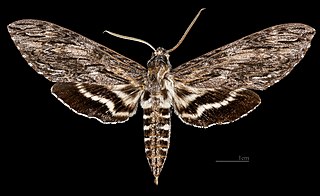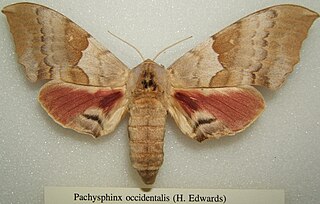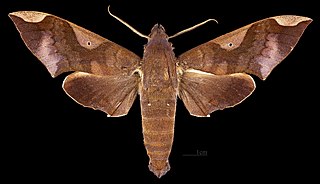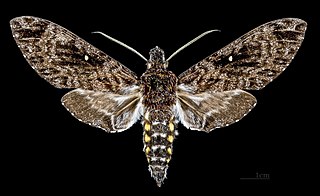
Cocytius lucifer is a moth of the family Sphingidae first described by Walter Rothschild and Karl Jordan in 1903.

Manduca occulta, the occult sphinx, is a moth of the family Sphingidae.

Sphinx asellus, the asellus sphinx moth, is a moth of the family Sphingidae. The species was first described by Walter Rothschild and Karl Jordan in 1903. It is known from pinyon-juniper woodland and similar arid areas in the US states of Colorado, Nevada, Utah, extreme south-western Wyoming, Arizona, New Mexico and south-western Texas.

Sphinx chersis, the great ash sphinx or northern ash sphinx, is a moth that belongs to the family Sphingidae.

Lintneria eremitoides, the sage sphinx, is a moth from the family Sphingidae. The species was first described by Herman Strecker in 1874. It is known from North America's sandy prairies in the Great Plains from Kansas south through central Oklahoma to Texas, and possibly west to Colorado and New Mexico, and as a rare stray to western Missouri.

Lintneria istar, the Istar sphinx moth, is a moth of the family Sphingidae. The species was first described by Walter Rothschild and Karl Jordan in 1903. It is found in mountains and pine-oak woodlands from southern Arizona east to southern Texas and south through Mexico to Guatemala.

Lintneria lugens is a moth of the family Sphingidae.

Lintneria separatus, the separated sphinx, is a moth of the family Sphingidae. The species was first described by Berthold Neumoegen in 1885. It is found from Colorado south through New Mexico and Arizona to Veracruz and Hidalgo in Mexico.

Pachysphinx occidentalis, the big poplar sphinx, is a moth of the family Sphingidae. The species was first described by Henry Edwards in 1875. It lives throughout Canada and the United States. The habitat consists of riparian areas and suburbs.

Eumorpha vitis, known as the vine sphinx, is a moth of the family Sphingidae.

Manduca bergi is a moth of the family Sphingidae first described by Walter Rothschild and Karl Jordan in 1903.

Dolbogene is a monotypic moth genus in the family Sphingidae erected by Walter Rothschild and Karl Jordan in 1903. Its only species, Dolbogene hartwegii, or Hartweg's sphinx, was first described by Arthur Gardiner Butler in 1875. It is found from Texas and southern Arizona to Mexico and Guatemala. Only a small number have been caught and not much is known about the biology of this species.

Eumorpha adamsi is a species of moth in the family Sphingidae. It was described by Walter Rothschild and Karl Jordan, in 1903, and is known from Venezuela, Brazil, Bolivia and Paraguay but is probably present throughout most of South America.

Nyceryx alophus is a moth of the family Sphingidae. It is found from Brazil to Bolivia, Argentina, Paraguay and Uruguay.

Nyceryx nictitans is a moth of the family Sphingidae. It is found from Brazil to Argentina and in Peru and Bolivia.

Pachylia syces is a moth of the family Sphingidae.

Manduca tucumana is a moth of the family Sphingidae.

Euryglottis albostigmata is a moth of the family Sphingidae first described by Walter Rothschild in 1895.
Sphinx adumbrata is a moth of the family Sphingidae. It is known from Mexico.

Sphinx crassistriga is a moth of the family Sphingidae. It is known from Japan.



















